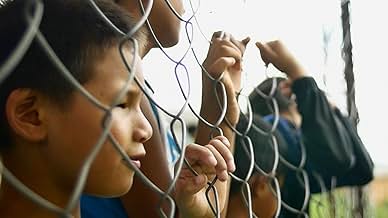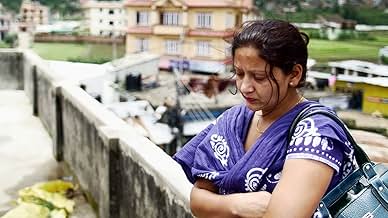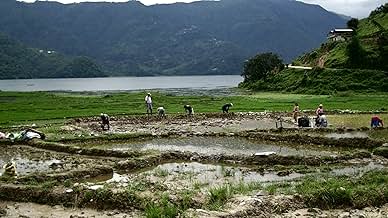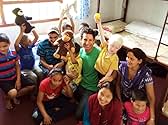Añade un argumento en tu idiomaBased on the true life stories of the children at the Goldungha Orphanage for the Blind in Nepal, Parivara is a positive and hopeful story following young Kopila through a fateful day in her... Leer todoBased on the true life stories of the children at the Goldungha Orphanage for the Blind in Nepal, Parivara is a positive and hopeful story following young Kopila through a fateful day in her life following the 2015 earthquake. It is a universal story demonstrating the beauty and ... Leer todoBased on the true life stories of the children at the Goldungha Orphanage for the Blind in Nepal, Parivara is a positive and hopeful story following young Kopila through a fateful day in her life following the 2015 earthquake. It is a universal story demonstrating the beauty and resilience of the human spirit.
- Dirección
- Guión
- Reparto principal
- Premios
- 15 premios y 5 nominaciones en total
Argumento
¿Sabías que...?
- CuriosidadesIn January 2017, 'Parivara' was awarded as Best Documentary Film in Calcutta International Cult Film Festival, in India.
The great theater of our life is a cosmic point full of forces that we ignore, that sleep, crouching within the small landscape of our daily existence and from time to time crosses the line of its destructive horizon to send us life or death.
This small documentary called 'Parivara', whose translation would be family, look in its images without stridencies, the meaning of all that good and all that evil, that we must cope with as human beings.
Shot in Nepal, which is located in the Himalayas, and surrounded by the People's Republic of China to the north, and India to the south, it is a mountainous country, possessing some of the highest peaks of the land, standing out Mount Everest, with its 8848 meters.
The meaning of family is the engine of his plot since the film tells of an orphanage called Goldungha, which welcomes blind children. Director, Alex Kruz, focuses his plot on a boy named Kopila, whose voice-over tells us how his life changed from 2015 when the terrible earthquake that would take him to the orphanage happened.
His mother's memories are affectionate, tender, and denote a search for a lost love that will never return to him: Kopila's childhood has been completely destroyed, but at the same time, it has also been rebuilt within that institution to the Who came so scared, so lost.
Kopila, little by little, learns the terrible lesson of life, of human suffering in this valley of tears that is the world. The child learns to live, helping others to live, in an act of reciprocity without limits between all the components of the orphanage. Kopila, one day, realizes that his mission is to help others to be as happy as he can be. This is the message that the film conveys to us: fraternity and the right to rebuild our lives, despite the disaster, despite the physical limitations, and the psychic traumas left by natural disasters.
The director, Alex Kruz, opts in his staging by serene images, shot in fixed planes that take their time so that the eyes of the viewer fix the physical space, the environment in which this child moves, brutally expelled from the Mother's womb. They are images of great beauty aesthetic, but intimately linked with the narrative of the film, composing a balanced film, that flees from the sentimentality, and does not trivialize the emotions, nor exposes the human miseries for free.
The other interesting point of the narrative is the voice of the child, who speaks to us without resentment, without fear, without weeping the past that knows that it has lost forever. This child called Kopila, rather lives the future, within his present that is the orphanage of blind children, where all are one, and where the problems of one are the problems of the community. Laughter, games, discipline, learning, love for existence and struggle for survival, are the rules of that institution that does not consider these blind children as a burden, but as citizens full of law, able to integrate into the world 'normal'. Like any other worker or intellectual.
Is the film too optimistic? It is possible, but the director's vision does not focus on this, but on the life of a community of people who, being rejected by society, struggle without discouragement every day of their lives to prove to themselves that they are the only World: their world, which is the only one they have.
'Parivara' is a wise mixture of smells, colors, sounds and hopes, very well presented cinematographically, with personality and intentionality; Perhaps there is an excess of academicism at some point, but it is not something negative for the whole.
The contrast between images of the jungle, where Kopila's infancy took place, and the orphanage, are very effective in understanding the cycle of life, its constant transformations and, above all, to give us the impression that life is an imposition, A leap into continuous emptiness, a privilege we almost never know enjoy, until we have lost everything and it is already late; But it is not late for Kopila, nor for any of those children who have found the piety of other people in their lives; But we speak of piety understood as an act of compassion and sincere love, and not of hypocritical and discriminating charity.
Parivara, you must look with these clear eyes, with this pure light, with these open hands and ready to cling to life. What if not cinema, but life?
Miguel Angel Barroso/Cult Critic/CICFF
- hlc-cicff
- 28 feb 2017
- Enlace permanente
Selecciones populares
Detalles
Taquilla
- Presupuesto
- 25.000 US$ (estimación)
- Duración12 minutos
- Color










